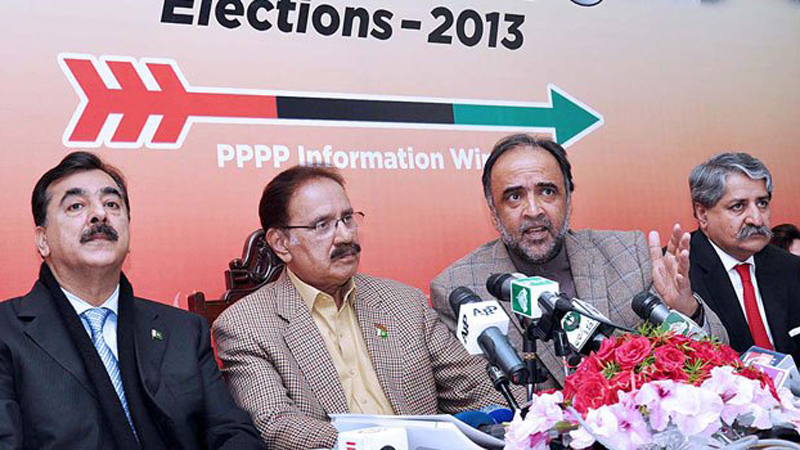ISLAMABAD: The May 2013 general elections saw the Pakistan Peoples Party (PPP)’s federal credentials being blasted to bits – the results were disastrous for the former ruling party, which found itself limited to Sindh.
The PPP which had grabbed more than 50 general seats of the National Assembly from Punjab, Khyber Pakhtunkhwa and Balochistan faced a virtual wipe-out in the three provinces in 2013.
As a result, senior leadership of the party was compelled to realise that looking beyond “Bhutto-ism” was necessary if they want to resurrect the PPP as a national party.
The crux of a discussion with three senior party leaders, who requested anonymity, was that the party should coin a new slogan, build a dynamic leadership and reorganize the party at the basic level.
They dismissed the impression that President Asif Ali Zardari would be thinking of contesting the presidential election as his term expires in September.
Officially, however, the PPP has decided to take a different stance. “Our workers are highly perturbed over the rigging, but we are not going to launch any agitation to protect democracy,” PPP Secretary General Latif Khan Khosa said.
He also said the party did not get a level playing field to run the election campaign. The offices were ransacked and the leaders faced life threats.
Official statements aside, however, a flurry of resignations followed the disastrous results. Punjab Governor Makhdoom Ahmed Mehmood, handpicked by President Zardari, also tendered his resignation. However, the president directed the provincial governors to keep on working till the oath-taking ceremony of the prime minister and the chief ministers, expected later this month.
The three PPP leaders who spoke to Dawn.com were among heavyweight candidates with bright prospects of repeating their 2008 election performance.
“We believe the slogan of Islamic socialism which Zulfikar Ali Bhutto had coined in the late 1960s has lost its vitality. The catchy motto of Roti, Kapra, Makan is not attractive anymore,” one of them stated, while the other two nodded.
They admitted their government failed to come up with any concrete development project which could be politically sold in the elections. They conceded the important constitutional reforms failed to generate enough appreciation among the electorate, which was fed up with power outages, economic woes and security threats.
In the run up to May 11 elections, the former ruling party executed a massive electronic and print media campaign, primarily targeting the PML-N. The tactics they applied were the same the antagonists of the PPP had used back in the 1988 general elections. The three leaders admitted the media campaign bounced back and failed to convince voters to re-elect the People’s Party.
On many occasions, the party leaders conducted deliberations to introduced structural changes in the party, but failed to take up the case before President Zardari and his sister Faryal Talpur, popularly called “Addi.”
“The Sharifs will go an extra mile to minimise load shedding in the country. Though the PML-N vowed to respect the PPP’s mandate in Sindh, it will overtly and covertly engage with anti-PPP forces to erode its popularity in the province till the next general elections,” one of them predicted.
One thing that emanated from the discussion was that the former ruling party never had a consistent policy and strategy to deal with multiple challenges. Owing to various reasons – including media onslaught and pressure from the judiciary – it altered its strategy on a day-to-day basis. Their failure to take a stand on different occasions might have bailed them out temporarily, but inflicted seemingly irreparable loss in the longer run.
The most bizarre incident was the selection of Raja Pervez Ashraf as prime minister. Along with Qamar Zaman Kaira, Ashraf was also the covering candidate for Makhdoom Shahabuddin, who was to succeed Yousuf Raza Gilani following his sacking.
On the last day of withdrawing nomination papers, some senior PPP leaders were present at the Election Commission of Pakistan (ECP) office when they heard the news that a sessions court had issued arrest warrants for Shahabuddin in the ephedrine case.
They panicked and tried to contact President Zardari, at around 12:00 p.m. They were told on the phone that the president went to bed at 4:00 a.m. in the morning and would wake up around 2:00 p.m.
Still dumbfounded, they rushed to the presidency and requested that the president be woken up. The aide-de-camp (ADC) refused, asking them to do it themselves. Amid that confusion, the president emerged from his bedroom. Someone had telephoned him to tell what had happened to Shahabuddin.
President Zardari inquired if Kaira was facing any criminal case of a serious nature which might impede his election as prime minister. The then information minister replied in the negative. He was told to be ready to become the chief executive of the country.
It was important to take the coalition partners into confidence. The Muttahida Quami Movement (MQM) and the Awami National Party (ANP) had no objection on Kaira’s nomination. But the largest coalition partner – the PML-Q – refused to support Kaira’s candidature. The Chaudhrys Gujrat plainly told President Zardari they would not accept anyone from their areas as prime minister because that would damage them politically in the elections.
Since there was no time to field a fresh candidate, President Zardari decided that Mr Ashraf would be the ruling coalition’s nominee. Mr Ashraf was facing corruption charges in the multi-billion rupee Rental Power Project scandal, and was considered by many a bad choice to head the country in the final year of the government.
To a question, the PPP leaders agreed that President Zardari would not seek re-election because the party and allies did not have enough numerical strength in the Electoral College comprising the Senate, the National Assembly and the four Provincial Assemblies.
Shahzad Raza is a freelance contributor. His twitter handle is @shahz79














































